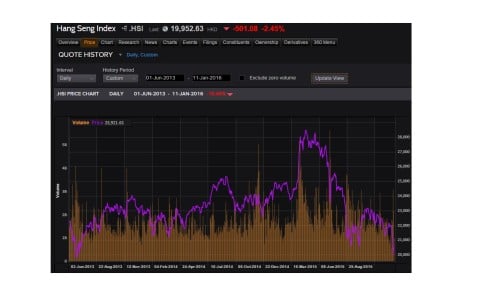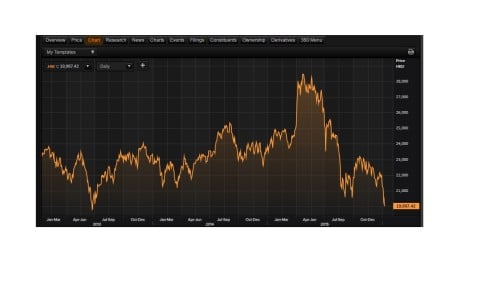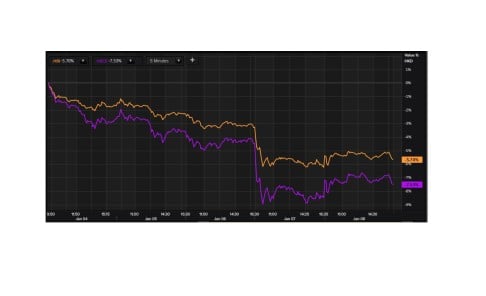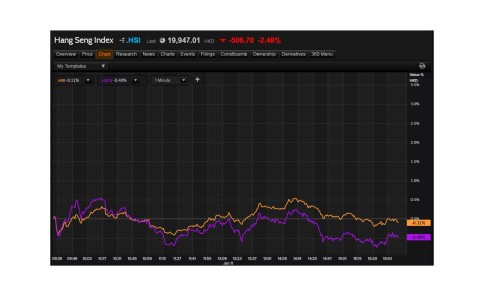
China Markets Live - Hong Kong stocks finish below 20,000 for first time since 2013; Shanghai and Shenzhen plunge amid China growth fears
Hong Kong, Shanghai and Shenzhen stocks all extend the sell-off from last week after weak inflation data reignite China growth fears; other major Asian markets dragged lower
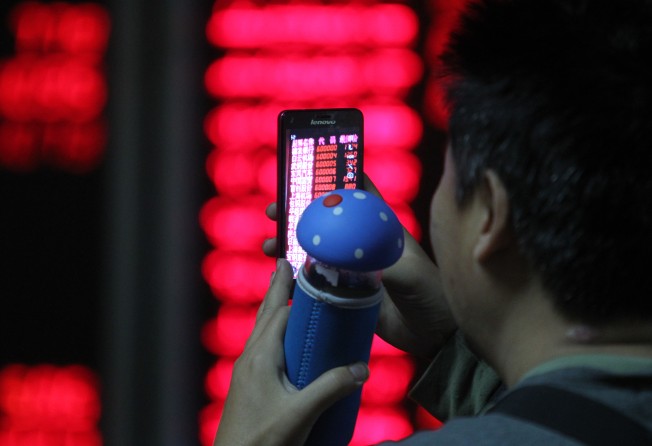
Welcome to the SCMP's live China markets. The intense volatility in Chinese markets into 2016 due to the implementation of the circuit breaker has roiled world financial markets. Investors are increasingly focused on the broader question of how this episode might affect the wider economy of the country. We'll bring you the key levels, trading statements, price action and other developments as they happen.
Here’s a summary of market action so far today:
- Hong Kong benchmark declines 2.8 per cent to close below 20,000
- Shanghai Composite plunges 5.3 per cent to four-month low
- Shenzhen Composite sinks 6.3 per cent to worst close in three months
- China's consumer inflation rises 1.4 per cent for 2015, well below government target of 3 per cent
- December's producer prices mark 46th straight month of declines
4:15 pm: The Hang Seng Index ended down 2.76 per cent, or 565.21 points, at 19,888.5, the lowest closing level since June 2013. The H-shares index finished at 8,505.16, falling 3.85 per cent or 340.73 points.
Below is the one day-chart of the Hong Kong market. Hang Seng Index (yellow), H-share index (purple). Click to enlarge the chart.
3:39 pm: Oil prices extended the slump from last week in Asian trade. The WTI crude futures for February delivery dropped 2.7 per cent to US$32.25 a barrel, and the February Brent crude futures fell 3.3 per cent to US$32.44 a barrel. Both WTI and Brent prices declined more than 10 per cent last week.
3:08 pm: The Shanghai Composite Index closed down 5.33 per cent, or 169.71 points, at a four-month low of 3,016.7. The CSI300 finished 5.03 per cent lower, or down 169.11 points, at 3,192.45.
The Shenzhen Composite Index ended down 6.6 percent or 130.62 points at 1,848.1, the worst settlement in three months. The ChiNext settled at 2,106.44, down or 6.34 per cent or142.55 points.
Below is the one-day chart for Chinese markets. Shanghai Composite Index (yellow), Shenzhen Composite Index (green), CSI300 Index (purple) and ChiNext (blue). The percentage levels on the right of the chart represent the differences from the opening, not from previous close. Click to enlarge the chart.
2:49 pm: Shares in Hong Kong-listed Convoy Financial Holdings plunged 6.49 per cent to 36 HK cents, after the wealth management company warned it may post a profit loss for 2015. Convoy said the loss may be due to an approximately HK$201-million fall in the value of “financial investments” held by the group, as well as a 55-per-cent decline in brokerage commission income.
2:17 pm: Major Asian markets fell across the board, dragged down by Chinese markets. Australia's S&P/ASX 200 finished down 1.2 per cent at 4,932.20. South Korea's Kospi Composite Index settled 1.2 per cent lower at 1,894.84. India's Sensex dropped 0.4 per cent to 24,831.31. Japan markets were closed for a public holiday.
2:10 pm: The Hang Seng Index traded down 2.18 per cent, or 445.05 points, at 20,008.66, looking set to finish below 20,000 for the first time since June, 2013.
The H-share index moved 3.41 per cent lower, or down 301.28 points, 8,544.61.
2:10 pm: The Shanghai Composite Index was at 3,085.93, off 3.15 per cent or 100.48 points. The CSI300 index was down 2.8 per cent, or 94.15 points, at 3,267.41.
The Shenzhen Composite Index sank 4.27 per cent, or 84.56 points, to 1,894.16. The NASDAQ-style ChiNext Price Index slid 3.61 per cent, or 81.19 points, to 2,167.8.
2:10 pm: Fitch Ratings Analysts Katie Chen and Grace Wu say that Chinese banks will continue to play a significant role in supporting state policy objects, “including extending credit to parts of the economy or borrowers that may otherwise be perceived as unfavourable on a risk-adjusted basis for commercial lenders.”
“Banks remain under heavy government influence that is unlikely to diminish in the near term even with financial liberalisation and ownership reforms,” analysts said, adding that China’s shift towards a consumption-led model will also be orderly as a result of heavy control by the authorities. “However, a large volume of high-risk credit exposures have built up in the banking system since its rapid expansion since 2008. That may limit the sovereign's ability to support the banking system if a worse-than-expected deterioration in the economy were to occur.”
2:00 pm: AXA Investment Managers expected the shocks in the Chinese market to be temporary, noting that “China is not on the verge of collapsing” and profit margins are the driving factor for the global equity market.
“The People’s Bank of China (PBoC) is still largely in control regarding domestic developments, and foreign investments in Chinese corporate debt are still very tiny,” said Eric Chaney and Franz Wenzel, analysts at AXA Investment Managers.
Excluding the energy and materials sector, which have been hit badly by declining commodity prices, profit margins are “holding up well at around 17 to 18 per cent, showing hardly any sign of deceleration”, they added.
“Going forward, we think that unit labour costs, which have been kindly (for profits) declining until now will stabilise, thus no more helping profit margins,” AXA analysts said. “Yet, with wage costs prospects remaining well contained, both because of sluggish growth and structural changes in the distribution of value added in favour of capital and top manager, we do not anticipate a significant rise in unit labour costs.”
1:12 pm: The Hang Seng Index opened the afternoon session lower by 2.39 per cent, or 488.79 points, at 19,964.92.
The H-share index, which tracks Hong Kong-listed Chinese companies, opened down 3.45 per cent, or 305.27 points, at 8,540.62.
1:12 pm: The Shanghai Composite Index opened the afternoon trade down by 2.71 per cent, or 86.25 points, at 3,100.16.
The Shenzhen Composite tumbled 3.97 per cent, down 78.53 points, to 1900.19. The Nasdaq-style ChiNext Price Index slid 3.87 per cent, or 86.96 points, to 2,162.03.
12:20 pm: Hong Kong stocks closed Monday's morning session at multi-year lows, with the benchmark Hang Seng index down 2.45 per cent, or 501.08 points, at 19,952.63, in its first fall below the 20,000-point level since June 2013.
The H-share index closed the morning trade 3.46 per cent lower, or down 306.33 points, at 8,539.56, trading at a four-year low.
11:57 am: Chinese stocks extended early falls by mid-session close, with the Shanghai Composite settling 2.40 per cent lower, or down 76.46 points, at 3,109.95. The CSI 300 index dropped 2.16 per cent, 72.76 points, to 3,288.80.
The Shenzhen Composite Index slumped 3.50 per cent, or 69.31 points, to 1,909.42 at lunch break.
Below is the midday chart for Chinese markets. Shanghai Composite Index (yellow), Shenzhen Composite Index (purple), CS1300 Index (green) and ChiNext (blue). The percentage levels on the right of the chart represent the differences from the opening, not from previous close. Click to enlarge the chart.
11:51 am: Moody's has cut the corporate rating for Chinese property developer Evergrande Real Estate Group from B2 to B1, while lowering the rating for the company's unsecured debt from B3 to B2.
The outlook for the ratings is negative, the rating agency said.
"The downgrade reflects Evergrande's increased level of financial risk, which is in turn because of its highly acquisitive appetite and debt-funded strategy for acquisitions," said Franco Leung, a senior analyst for Moody's.
In the second half of 2015, Evergrande announced several key acquisitions totaling 59.5 billion yuan, including Chinese property-development project companies New World Development (China) Ltd and Chow Tai Fook Enterprises Ltd, as well as a 50 per cent equity stake in a life insurance company.
The company's high level of debt concerns Moody’s, as it will strain cash flow over the next two years, in turn weakening the Evergrande’s liquidity position, Moody’s said.
"The downgrade also reflects the aggressive buy-back options offered in its presales contracts, a situation which adds uncertainty to its cash flow," said Leung.
Moody's expects Evergrande's debt leverage -- measured by revenue/adjusted debt -- to remain weak in the 47 per cent to 53 per cent range over the next 12 to 18 months, versus around 53 per cent at the end of June in 2015.
11:41 am: Shares in Hong Kong-listed jeweller Chow Tai Fook Jewellery Group Ltd fell to a record low, after the firm reported an 11 per cent drop in retail sales value in the three months ended December. Shares traded as low at HK$4.50 before recovering slightly to HK$4.55 in late morning trade, marking a 3.6 per cent decline from Friday's closing level.
11:10 am: The onshore yuan strengthened slightly against the greenback Monday morning, up 0.18 per cent to 6.5828 per US dollar. Offshore yuan was also firmer by 0.09 per cent to 6.6771 per US dollar after a brief initial weakening.
11:08 am: Hong Kong’s Hang Seng index lost 2.47 per cent, or 505.99 points, to 19,947.72. The H-share index, which tracks Hong Kong-listed mainland companies, slid 3.33 per cent, or 294.62 points, to 8,551.27.
11:08 am: Chinese stock markets have fallen back again after an earlier attempt to rebound from opening lows. The benchmark Shanghai Composite index dropped 1.42 per cent, or 45.17 points, at 3,141.24. The CSI300 index fell 1.27 per cent, or 42.69 points, at 3,318.87.
The Shenzhen Composite Index declined 2.37 per cent, or 46.85 points, to 1,931.87.
11:02 am: Hong Kong large-cap stocks were almost all trading lower Monday morning, as stocks struggled to recover from early falls prompted by weak Chinese inflation data, extending last week’s heavy losses.
Telecoms giant China Mobile led the decliners measured for turnover, sliding 2.32 per cent to HK$80.15. Online major Tencent fell 2.45 per cent to HK$139.10. Index weight HSBC was off 1.83 per cent at HK$56.35.
Among Hang Seng index components, China Resources Beer was the standout winner, rising 1.97 per cent to HK$15.50.
10:54 am: A wholly owned subsidiary of Hong Kong listed fisheries group Pacific Andes International Holdings Ltd has allegedly breached the terms of a S$200 million (HK$1.08 billion) bond, the company reported in an exchange filing published Sunday evening.
The subsidiary, Pacific Andes Resources Development Ltd, received a letter dated January 7 from HSBC as trustee of the 8.5 per cent coupon bond due 2017, “alleging that PARD is in breach of certain of its obligations under the terms and conditions of the Bonds.”
The exchange filing did not provide further details on the alleged breach though Pacific Andes did state it was seeking legal advice. The firm’s Hong Kong shares have been suspended since November last year.
10:34 am: China’s latest inflation data underscores the scale of the challenges the Chinese economy faces in 2016, according to a research report by HSBC.
All measures of inflation have fallen sharply over the course of 2015. Consumer price index inflation averaged 1.4 per cent, down from the 2 per cent level in 2014 and a long way below 3 per cent target initially set by policy makers. Producer price index inflation averaged minus 5.2 per cent, significantly lower than the 2014 average of minus 1.9 per cent.
“We believe these deflationary pressures are rooted in weak demand and must be countered by more decisive monetary and fiscal easing. In fact, as economic growth looks set to slow in 2016 (our forecast is 6.7 per cent), deflation will likely deepen,” said HSBC analysts.
The bank forecast a 50 basis point cut in base rates and a 400 basis point cut in reserve ratio requirements in 2016.
“Timely and decisive policy easing will hold the key to anchoring growth and countering deflation in 2016,” analysts noted.
10:29 am: China’s latest inflation data should not give policymakers too much cause for concern, said analysts at Capital Economics.
China's consumer price index rose 1.4 per cent last year on a full-year basis, well below the government’s target of 3 per cent, according to data released over the weekend by the National Bureau of Statistics.
Key food prices including pork and vegetables rose 9.5 per cent and 7.4 per cent year-on-year respectively, while a fall in global oil prices weighed on the index. Producer prices contracted 5.2 per cent last year.
“Consumer price inflation remains high enough to keep concerns about deflation at bay but low enough to give policymakers plenty of room to loosen further,” wrote the firm’s chief China economist Mark Williams.
Predicting a rebound in oil prices, whose fall has been partially responsible for sluggish inflation figures worldwide, Williams said. China’s lower producer prices are also a feature of falling commodity prices, which should leave the overall economy better off. “In any case, a year after the steepest commodity price declines, producer price inflation should be on the cusp of a rebound,” he wrote.
10:20 am: Hong Kong’s Hang Seng index fell further after the lower open, down 2.38 per cent, or 486.09 points, at 19,967.62. 48 out of the 50 constituent stocks were in the red. The H-share index, which tracks Hong Kong-listed mainland companies, dropped 2.80 per cent, or 247.46 points, at 8,598.43.
Click here to read more.
10:20 am: Chinese stock markets have rebounded from opening lows, with the benchmark Shanghai Composite index only off 0.74 per cent, or 23.52 points, at 3,162.89. The CSI300 index lost 0.77 per cent, or 25.85 points, at 3,335.71.
The Shenzhen Composite Index moved down 1.14 per cent, or 22.61 points, to 1,956.11.
10:09 am: Analysts at ING say the PBOC is trying to the keep the onshore yuan rate “basically stable at a reasonable equilibrium level” against a basket peg though there remains “enough uncertainty about the policy framework” to warrant a close eye on the daily fixings.
The continual fall in Chinese producer prices, which fell 5.9 per cent in December, will persist until oil prices stabilise, ING wrote. The Dutch bank forecasts 50 basis points of PBOC rate cuts in 2016 taking the one year lending rate to 3.85 per cent by year end.
9:40 am: Chinese stock markets also opened lower, with the benchmark Shanghai Composite index off 1.72 per cent, or 54.76 points, at 3,131.65. The large-cap CSI300 index was down 1.68 per cent, or 56.34 points, at 3,305.22.
The Shenzhen Composite was 2.39 per cent lower, or 47.32 points, at 1,931.41.
9:36 am: Hong Kong's benchmark Hang Seng index fell below the key 20,000-point mark for the first time since June 2013. It opened down 2.23 per cent at 19,997.42. Click to enlarge the below chart.
The Hang Seng China Enterprises index, or the H-share index, also dropped sharply at open, down 2.83 per cent to 8,595.93.
9:22 am: People’s Bank of China (PBOC) set the yuan's midprice at 6.5626 this morning, stronger by 10 basis points from Friday. This marked the second straight day that the central bank set the midprice stronger after guiding the yuan lower in the previous eight sessions in a row.
However, the PBOC set the yuan weaker against the euro at 7.1936, down 201 basis points. It also set the yuan's midprice at 5.6163 against every 100 yen, weaker by 291 basis points.
Traders are allowed to trade up or down 2 per cent of the reference price for the day.
9:17 am: Onshore yuan and offshore yuan both hit five year lowest last week.Onshore rate was down 1.5 per cent, while offshore rate weakened by 1.7 per cent.
One week graph for onshore yuan (CNY) and offshore yuan (CNH) from January 4 to 8. Click to enlarge the chart.
9:14 am: Movement of mainland China's stock markets from January 4 to January 11. Shanghai Composite Index (orange), Shenzhen Composite Index (green), CSI 300 (purple) and ChiNext (blue). Click to enlarge the chart.
9:10 am: The movement of the Hang Seng Index (yellow) and H-shares index (purple) during the week of January 4 to January 8. Click to enlarge the chart.
9:03 am: The Hang Seng Index futures spot January contract dropped 549 points or 2.69 per cent to 19,850 in the pre-opening session. The weak start comes after below-target inflation data was released by China’s National Bureau of Statistics over the weekend, while markets are also likely to take their cue from a poor opening for markets across the region with Australia’s ASX 200 index 1.78 per cent weaker at 4,901.80 in Monday morning trading.
China’s benchmark Shanghai Composite Index plunged 10 per cent last week, its worst weekly performance since August, wiping out all the remaining stock market gains for 2015.
The Hang Seng Index finished the week 6.52 per cent weaker at 20,435.91.
Click here to read more.

